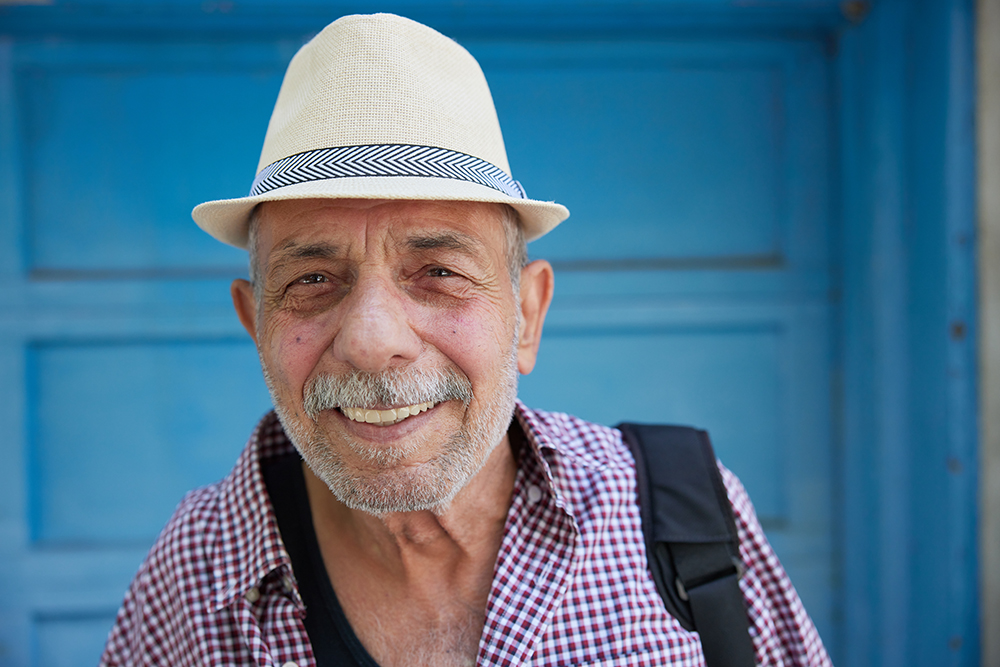
In 2009, I started a new life with my family in the U.S. It had long been a dream of mine. I lived in the Bronx, New York, where I managed a parking garage.
I often returned to Syria to live there with family for months at a time. In 2022, while I was in Syria, I became very ill. My doctors there could only give me expired medication to treat my heart failure, and every day I felt worse. Eventually, I was hospitalized.
My doctor told my sons to come and say goodbye. There was nothing more that my doctors could do for me.
That’s when I decided, with my sons and my doctors in Syria, to come home to the U.S. for better treatment options. It was a risky trip in my condition, but coming to Temple saved me.
Diagnosed With a Failing Heart
My health problems started a few years ago. I began feeling short of breath and very tired. Day by day, month by month, my situation gradually became worse. I used to smoke, so I thought the problem was with my lungs. But it turns out it was my heart.
In 2019, when I was 62, my doctor in Syria diagnosed me with advanced heart failure. He explained that heart failure occurs when a weakened heart can’t pump blood well enough to meet the body’s needs. As I said, I was short of breath and often tired. But other heart failure symptoms include swelling of the feet and ankles, and coughing.
I have other heart problems in addition to heart failure, including coronary artery disease (CAD), which is a narrowing of blood vessels in my heart. In Syria, my doctors prescribed various treatments for my heart problems, including medications. They also put stents in my heart to help treat my CAD.
But even with these treatments, my health kept getting worse. Fluid was building up in my lungs, and I couldn’t breathe well. I lost weight. My doctors said they couldn’t do any more. I was very ill, and the trip home to the U.S. would be dangerous. But it was my only chance.
A Heart Pump and a Second Chance
I returned to the U.S. in February 2022. I couldn’t go directly. I had to travel from Damascus, in Syria, to Lebanon and then to Qatar, where I boarded a plane to the U.S. My family was very worried about me. They didn’t know if I’d survive such a long journey halfway around the world.
My son took me directly from the airport to a local hospital near his home. I was in bad shape — what doctors call cardiogenic shock. My heart was so weak it could not pump enough blood to my brain and other vital organs. My weight was down to about 100 pounds. Because I needed a higher level of care, I was transferred to Temple University Hospital.
Doctors at the Temple Heart & Vascular Institute were able to get me through this life-threatening situation with medications and other treatments. Then they began to prepare me for another treatment, called a ventricular assist device (VAD), which is a mechanical heart pump.
It took nearly two months until I became strong enough to withstand the heart surgery to implant my VAD. Then, in March 2022, I underwent LVAD surgery, performed by Yoshiya Toyoda, MD, PhD, Chief of Cardiovascular Surgery. My Temple team also included Eman A. Hamad, MD, Director of the Advanced Heart Failure & Transplant Program. She cared for me throughout my journey at Temple. Dr. Hamad and Dr. Toyoda are some of the best doctors anywhere.
They told me that VADs help the heart pump better, so that people with advanced heart failure, like me, can feel better and live longer. They also told me that sometimes this device is used while waiting for a heart transplant, and is called a bridge-to-transplant.
My VAD helps my heart’s left ventricle pump blood, so it is called an LVAD. It runs on batteries that I wear in a special vest. My doctors call the pump in my heart a type of mechanical circulatory support. It is one of the treatments Temple’s Advanced Heart Failure, Circulatory Support, and Transplantation Program provides.
Feeling Good — and Grateful Beyond Words
I’m feeling much better after my VAD surgery. I walk and do many of my daily activities. I love to cook. I’m enjoying life with my family. One day, when I’m healthy enough, I hope to go upland game bird hunting again. I enjoy the outdoors and hunting very much!
My LVAD surgery and my Temple team have given me time and hope. I thought I was going to die, but Dr. Toyoda told me I had many years to look forward to. Now I hope to be placed on a heart transplant waiting list.
For now, I’m taking life one day at a time. Looking back on my journey, I'm so thankful for everyone who helped me, especially the nurses and the doctors and everyone at Temple who took care of me before, during, and after my LVAD surgery. These amazing people treated me like I was a part of their family. They were all so good to me, and I have made friends with many of the nurses.
It’s not enough to say thank you. It’s more than that. I need a new word to say how thankful I am for what they did for me. They gave me a new life.
Helpful Resources
Looking for more information?